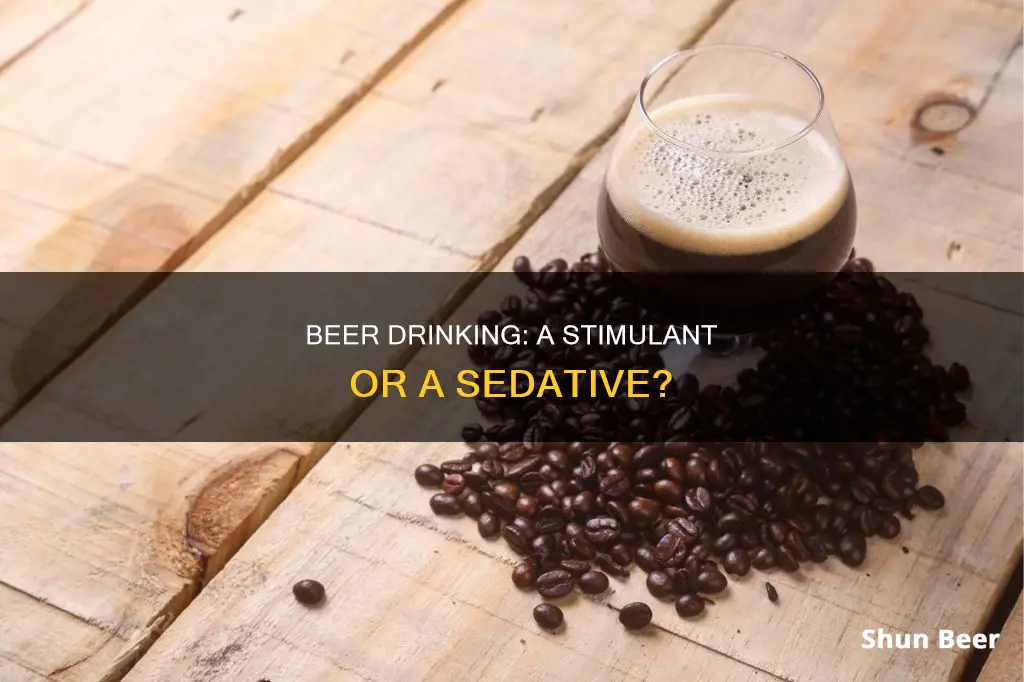
Alcohol is a depressant that can help you fall asleep faster, but its effects quickly wear off as your body tries to eliminate it from your system. According to experts, drinking alcohol before bed can lead to frequent awakenings and overall low-quality sleep. While alcohol may initially make you drowsy, as your blood alcohol level drops, your brain rebounds from this state, disturbing your sleep and causing multiple awakenings, especially in the second half of the night. This disruption primarily affects deep rapid eye movement (REM) sleep, which is crucial for regulating emotions and cognitive function.
| Characteristics | Values |
|---|---|
| Effect on sleep | Even one drink can negatively impact sleep quality |
| Sleep disruption | Wakes you up multiple times, particularly in the second half of the night |
| Sleep reduction | You sleep less overall |
| Long-term impacts | Poor sleep quality and more sleep disturbances over time |
| REM sleep | Inhibits REM sleep, considered the most restorative phase of sleep |
| Sleep architecture | Alters sleep architecture |
| Sleep disorders | Can contribute to the development of insomnia |
| Sleep apnea | Can make existing sleep apnea worse and increase a person's risk for sleep apnea |
What You'll Learn
- Alcohol affects sleep architecture, causing more N3 sleep and less REM sleep
- Alcohol negatively impacts sleep quality, even in light drinkers
- Drinking alcohol before bed can lead to frequent wakings and low-quality sleep
- Alcohol can worsen sleep disorders like sleep apnea and insomnia
- Drinking tips to minimise the impact of alcohol on sleep

Alcohol affects sleep architecture, causing more N3 sleep and less REM sleep
Alcohol has a significant impact on sleep architecture, causing more N3 sleep and less REM sleep. When consumed before bed, alcohol alters the typical sleep cycle, which usually begins with three non-rapid eye movement (NREM) stages and ends with rapid eye movement (REM) sleep.
NREM sleep is characterised by decreased muscle tone, slower breathing, and a lack of dreams. It is further divided into four stages, with the third stage (N3 sleep) being the deep sleep stage. REM sleep, on the other hand, is associated with rapid eye movements, increased brain activity, and vivid dreams.
Alcohol acts as a sedative, increasing the duration of deep sleep (N3 sleep) during the first half of the night. However, as blood alcohol levels decrease, individuals experience more light sleep (N1 sleep) and frequent awakenings during the second half of the night, resulting in fragmented and poor-quality sleep. This disruption to the sleep cycle can lead to next-day fatigue and sleepiness.
Additionally, alcohol appears to delay the onset of REM sleep and reduce its overall duration. REM sleep is crucial for memory consolidation and cognitive function, and its suppression can have detrimental effects. Chronic alcohol use is associated with long-term sleep disturbances, including decreased slow-wave sleep and increased REM sleep, even after periods of abstinence.
The negative impact of alcohol on sleep architecture is influenced by the amount consumed and individual factors such as sensitivity to alcohol and the consumption of food with alcohol. It is recommended to avoid alcohol at least three hours before bedtime to minimise its disruptive effects on sleep.
Non-Alcoholic Beer and AA Members: Is It Safe?
You may want to see also

Alcohol negatively impacts sleep quality, even in light drinkers
Alcohol disrupts the typical sleep cycle, which begins with three non-rapid eye movement (NREM) stages of sleep and ends with rapid eye movement (REM). During sleep, the body cycles through all of these stages every 90 to 120 minutes, with NREM sleep dominating the first part of the night and REM increasing during the second part of the night. Each stage is necessary for sleep to feel refreshing and for vital processes like learning and memory consolidation to occur.
When you go to bed with alcohol in your system, you’re likely to experience more N3 sleep (deep sleep) and less REM sleep than usual, at least initially. Later in the night, once your body has metabolized the alcohol, you’re likely to experience a rise in N1 sleep (the lightest stage of sleep). This can lead to frequent wakings and fragmented, low-quality sleep.
Alcohol can also disrupt sleep by interfering with circadian rhythms and contributing to sleep disorders such as snoring and sleep apnea. Long-term alcohol use can result in chronic sleep problems and disorders like insomnia and sleep apnea.
Experts recommend avoiding alcohol at least three hours before bed. However, some people may benefit from avoiding alcohol for even longer or abstaining altogether. The more alcohol you drink and the closer you drink it to bedtime, the stronger its effects will be on your sleep.
Beer for Slugs: Does It Work?
You may want to see also

Drinking alcohol before bed can lead to frequent wakings and low-quality sleep
Firstly, alcohol affects the sleep cycle by altering sleep architecture. Usually, the sleep cycle begins with three non-rapid eye movement (NREM) stages and ends with rapid eye movement (REM) sleep. When alcohol is in the system, the body experiences more N3 sleep or "deep sleep" and less REM sleep. Later in the night, once the body has metabolised the alcohol, it experiences a rise in N1 sleep, the lightest stage of sleep, leading to fragmented sleep.
Secondly, alcohol interferes with sleep by disrupting REM sleep, often considered the most mentally restorative phase of sleep. This disruption results in people waking up feeling tired and groggy, as REM sleep is essential for regulating emotions and cognitive function.
Thirdly, alcohol consumption before bed can lead to sleep disorders such as sleep apnea. Alcohol acts as a muscle relaxant, causing the tongue and throat muscles to relax and increasing airway resistance in the nasal passages. This leads to more snoring and lower oxygen levels in the blood, negatively impacting sleep quality.
Additionally, drinking alcohol before bed can cause circadian rhythm disruptions. Alcohol decreases the body's sensitivity to cues like daylight and darkness, which trigger shifts in body temperature and the secretion of the sleep hormone melatonin. These fluctuations are crucial for the sleep-wake cycle, and when weakened or absent, individuals may feel alert when they want to sleep and sleepy when they want to be awake.
The negative impact of alcohol on sleep is supported by research. A 2018 study found that alcohol reduced sleep quality by 9.3% for low intake, 24% for moderate intake, and nearly 40% for heavy intake. The study also showed that alcohol affected men and women similarly and that younger people were more affected than older adults.
To minimise the impact of alcohol on sleep, it is recommended to allow a minimum of three hours between the last drink and bedtime. Drinking water along with alcohol and consuming alcohol with a meal can also help reduce its negative effects on sleep.
Hotel Drinking: Beer Rules and Room Service
You may want to see also

Alcohol can worsen sleep disorders like sleep apnea and insomnia
Alcohol can have a detrimental effect on sleep, worsening sleep disorders such as sleep apnea and insomnia.
Sleep Apnea
Sleep apnea is a sleep disorder characterised by repeated interruptions to breathing during sleep, often accompanied by loud snoring, gasping, choking, or snorting sounds. Drinking alcohol can worsen sleep apnea by relaxing the muscles in the airway, causing obstructions in the upper airway. Alcohol also increases the time between when someone stops breathing and when they wake up to breathe again, and can cause nasal congestion, making it even harder to breathe.
Research has shown that people with alcohol dependence have a higher risk of developing obstructive sleep apnea (OSA), especially if they already snore. Even people without OSA can experience sleep apnea symptoms after drinking.
Insomnia
Insomnia is a sleep disorder that affects people's ability to fall asleep or stay asleep. Alcohol is a central nervous system depressant, which can disrupt sleep schedules and sleep quality. While small amounts of alcohol may help people fall asleep faster, it diminishes the amount of REM sleep in the second half of the night, leading to more frequent wakings and fragmented, low-quality sleep.
Long-term alcohol use and dependence can contribute to the development of insomnia. As many as three-quarters of people with alcohol dependence experience insomnia symptoms when they drink. Conversely, people with insomnia are also at an increased risk of developing alcohol use disorder, as they may turn to alcohol as a sleep aid.
Beer Drinking: Healthy Habit or Health Hazard?
You may want to see also

Drinking tips to minimise the impact of alcohol on sleep
Alcohol is a depressant and can help you fall asleep faster. However, these effects quickly wear off as your body tries to eliminate the alcohol from your system. Here are some tips to minimise the impact of alcohol on your sleep:
- Allow at least three hours between your last drink and bedtime. The more alcohol you drink and the closer you drink it to bedtime, the stronger its effects will be.
- Drink water along with alcohol to help flush it out of your system.
- Drink alcohol while eating a meal. This helps to keep drinking in check since you're likely eating a few hours before bed.
- Avoid alcohol if you're taking sleeping pills. Both are depressants, and in combination, they can make it hard for a person to breathe while sleeping, which can be dangerous.
- If you snore persistently, whether you've been drinking or not, it could be due to a sleep disorder such as sleep apnea. Alcohol can make existing sleep apnea and snoring worse, and higher levels of alcohol consumption can increase a person's risk for sleep apnea.
It's important to note that even light alcohol consumption can negatively impact your sleep. According to experts, consuming alcohol before bed can lead to frequent wakings and overall low-quality sleep.
Alcohol-Free Beer and Metronidazole: Is It Safe?
You may want to see also
Frequently asked questions
Drinking alcohol before bed can lead to frequent wakings and low-quality sleep. As your body processes the alcohol, it disrupts your sleep.
Alcohol affects the chemical messengers in your brain known as neurotransmitters, slowing down communication between nerve cells. This leads to feelings of relaxation and drowsiness. However, as your body processes the alcohol, the brain rebounds from the drowsiness, disturbing your sleep.
Experts recommend avoiding alcohol at least 3 hours before bed. The more alcohol you drink, the more your sleep will be disrupted. Even a single drink can negatively impact your sleep.
Here are some tips:
- Swap every other drink with a non-alcoholic one.
- Avoid drinking close to bedtime.
- Eat while you drink to slow down alcohol absorption.
- Avoid caffeinated drinks.
- Stay hydrated by drinking plenty of water.







